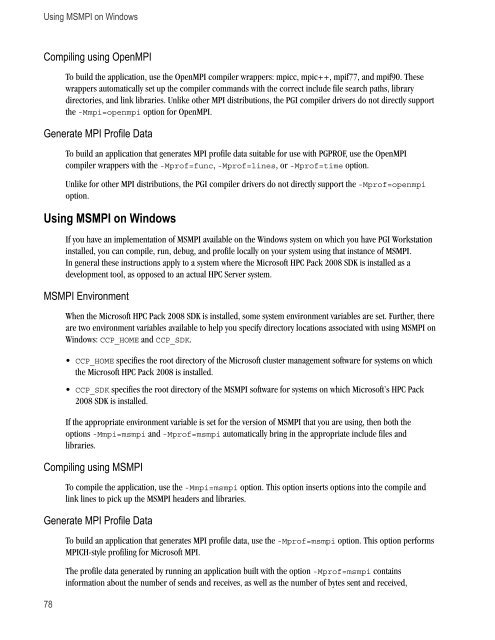PGI User's Guide
PGI User's Guide
PGI User's Guide
- No tags were found...
You also want an ePaper? Increase the reach of your titles
YUMPU automatically turns print PDFs into web optimized ePapers that Google loves.
Using MSMPI on WindowsCompiling using OpenMPI78To build the application, use the OpenMPI compiler wrappers: mpicc, mpic++, mpif77, and mpif90. Thesewrappers automatically set up the compiler commands with the correct include file search paths, librarydirectories, and link libraries. Unlike other MPI distributions, the <strong>PGI</strong> compiler drivers do not directly supportthe -Mmpi=openmpi option for OpenMPI.Generate MPI Profile DataTo build an application that generates MPI profile data suitable for use with PGPROF, use the OpenMPIcompiler wrappers with the -Mprof=func, -Mprof=lines, or -Mprof=time option.Unlike for other MPI distributions, the <strong>PGI</strong> compiler drivers do not directly support the -Mprof=openmpioption.Using MSMPI on WindowsIf you have an implementation of MSMPI available on the Windows system on which you have <strong>PGI</strong> Workstationinstalled, you can compile, run, debug, and profile locally on your system using that instance of MSMPI.In general these instructions apply to a system where the Microsoft HPC Pack 2008 SDK is installed as adevelopment tool, as opposed to an actual HPC Server system.MSMPI EnvironmentWhen the Microsoft HPC Pack 2008 SDK is installed, some system environment variables are set. Further, thereare two environment variables available to help you specify directory locations associated with using MSMPI onWindows: CCP_HOME and CCP_SDK.• CCP_HOME specifies the root directory of the Microsoft cluster management software for systems on whichthe Microsoft HPC Pack 2008 is installed.• CCP_SDK specifies the root directory of the MSMPI software for systems on which Microsoft’s HPC Pack2008 SDK is installed.If the appropriate environment variable is set for the version of MSMPI that you are using, then both theoptions -Mmpi=msmpi and -Mprof=msmpi automatically bring in the appropriate include files andlibraries.Compiling using MSMPITo compile the application, use the -Mmpi=msmpi option. This option inserts options into the compile andlink lines to pick up the MSMPI headers and libraries.Generate MPI Profile DataTo build an application that generates MPI profile data, use the -Mprof=msmpi option. This option performsMPICH-style profiling for Microsoft MPI.The profile data generated by running an application built with the option -Mprof=msmpi containsinformation about the number of sends and receives, as well as the number of bytes sent and received,
















